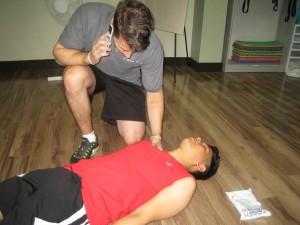Traumatic brain injury involves an external force to the head that leads to damage or injury to the brain. This can vary from a minor blow to the head that result to transitory dizziness or a life-threatening brain injury due to major trauma such as during vehicular accidents.
Since traumatic brain injury covers a comprehensive range of injuries, the symptoms, effects and prognoses tends to vary. Almost every year, millions of incidents of TBI occur all over the globe. These minor injuries typically require treatment at a healthcare facility. Some cases have resulted to lasting disability. Based on statistics, traumatic brain injury are likely to occur among men than women. In addition, the risk is increased after age 60.
What are the causes?
The usual cause of traumatic brain injury is motor vehicular accidents which accounts for almost half of cases that require hospitalization. This is followed by sports or physical activity and then assaults.

For those who are over 65 years old, falls is the main cause. Take note that gunshot wounds as a cause for traumatic brain injury is also increasing in the recent years.
What should I do after a traumatic brain injury?
Always bear in mind that any type of traumatic brain injury regardless of how minor it appears must be taken seriously. In case loss of consciousness occurs regardless how brief, a doctor must be consulted as soon as possible. Even if loss of unconsciousness does not occur, the number of hours that follow after the injury is still vital and you have to watch out for the following symptoms:
- Slurred speech
- Headache
- Restlessness
- Vomiting
- Change in the appearance of the pupils
- Increased drowsiness
- Memory loss
- Confusion on the time or date
Once any of these symptoms occur, a doctor should be consulted right away since it indicates that the brain is swollen or bleeding.
Effects of TBI
The effects of traumatic brain injury tend to vary in scope from full recovery to severe disability. As for severe cases of TBI, gradual improvements in function can continue for up to 10 years after the injury. The typical disabling injuries can affect 3 main aspects of life:
- Cognition – memory, concentration, mood, judgment, reasoning and comprehension
- Movement – coordination, strength and balance
- Sensation
Some individuals with traumatic brain injury can also suffer from behavioral issues such as irritability, agitation, aggressiveness, depression, anxiety and impulsivity. In some cases, TBI can result to a seizure disorder.
Prevention and management
Even though not all can be prevented, there are measures that can be taken to minimize the risk for injury. Individuals who ride motorcycles without a helmet face a higher risk of TBI than those who use helmets.
The recovery and management of traumatic brain injury varies for each injury. Regardless of the severity of the injury, support from family is vital.
